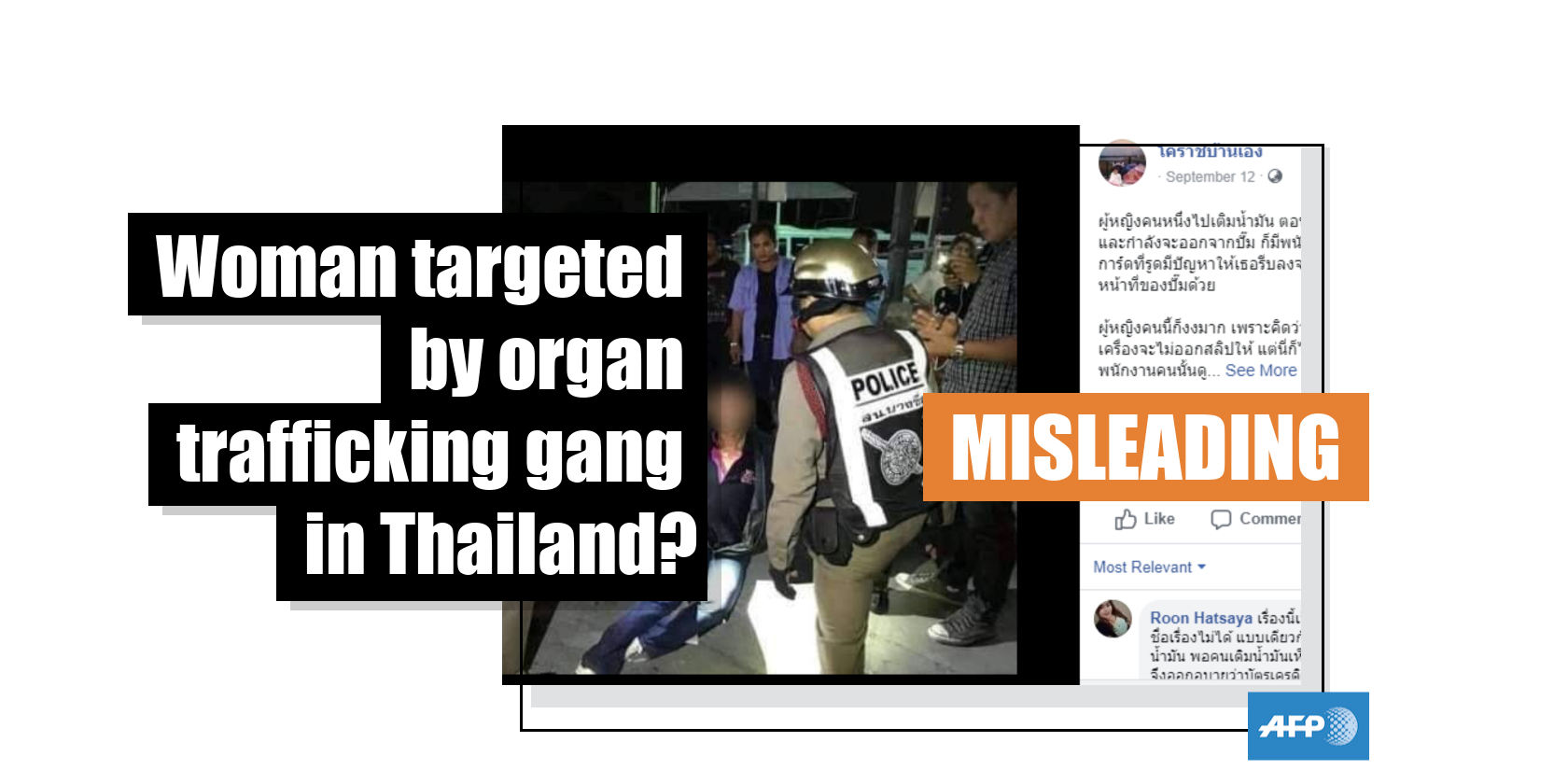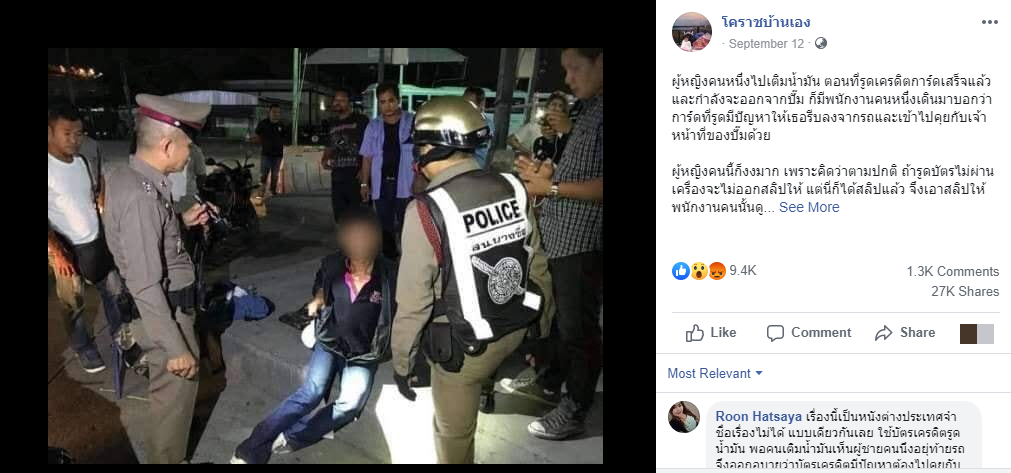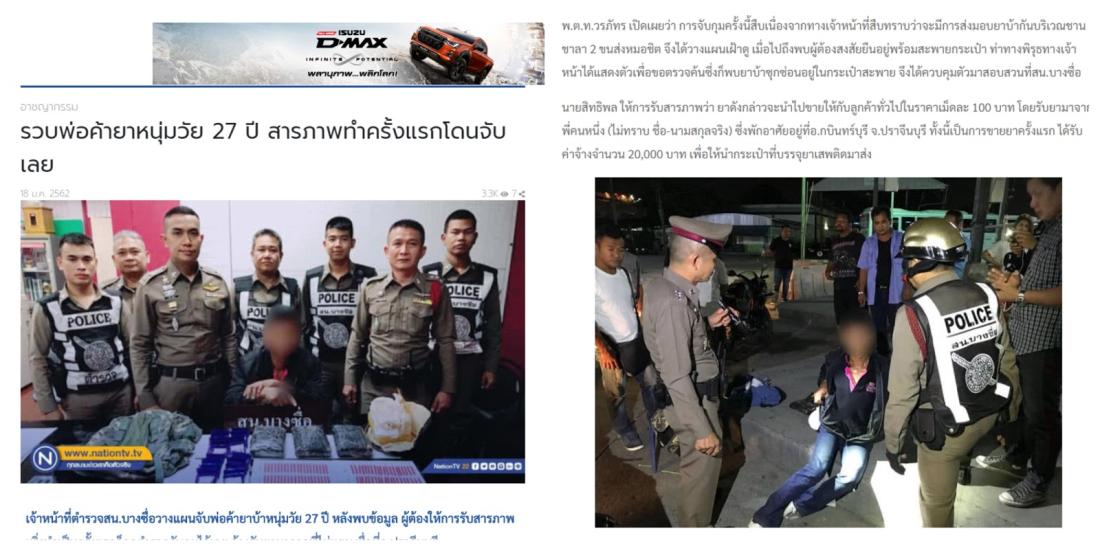
This photo has circulated in media reports about an alleged drug dealer arrested in Thailand -- not a woman targeted by organ traffickers
- This article is more than six years old.
- Published on November 20, 2019 at 10:00
- 3 min read
- By AFP Thailand
The photo was published in this Facebook post on September 12. It has been shared more than 27,000 times.
Below is the screenshot of the misleading post:

The lengthy Thai-language caption translates to English in part as:
“One woman goes to a gas station. When she finished paying by credit card, she was told by a gas station staff that they experienced a problem with her card and asked her to leave the car to talk to one of the gas station employees.
“This woman was very confused because she felt it was unusual that the card had a problem as she had already received the payslip. She said to the staff that they have already confirmed the payment and she had other errands to run.
“However, the staff member insisted that she had to talk to them anyway. Then, they told her that while they were filling up the gas tank, they saw a man opening the door of her car and sitting behind the driver's seat, so they rang the police for her. They wanted her to stay away from the car, for her own safety.
“At that moment, she saw a man opening the door and getting out of the car. Later we have found out that was a new form of crime: female organ trafficking group, that they will sneak into a female driver car at a gas station. The method is that they will cut the tendon, to prevent the victim from fleeing. Then, they will drive the victim's car to kill and dissect the organs into pieces."
The photo was published alongside a similar claim here, here and here.
But the photo is being used in a misleading context -- it has previously circulated online in reports about a drug arrest.
A Google reverse image search found the same photo was published here by Thai television channel Nation TV on January 18, 2019.
The article’s Thai-language headline translates to English as: “Arresting a 27-year-old drug dealer, the first time he did it and he got arrested.”
Below are two screenshots of the article:

The article’s first paragraph translates to English as: “Police officers at Bang Sue Police Station planned to arrest a 27-year-old methamphetamine dealer. He confessed it was the first time that he did it, and he was arrested by the police. He claimed to receive the pills from an unknown name in Prachinburi.”
Prachinburi is a province of Thailand.
Banjerd Tajuang, Chief of Investigation Department, Bang Sue Metropolitan Police Station told AFP by phone on November 12, 2019: “On January 18, 2019, the police officers found the suspect carrying a large travel bag on his shoulder at Mochit Bus station. He was acting suspiciously, so the police officers asked him what was he carrying in that bag. Then, we found 24,240 pills inside.”
“The case has been closed and he was sentenced to jail for 2 years.”
Thai anti-trafficking police told AFP they had no reports of any human organ trafficking gangs in the country.
“We have never received any cases like the human organ trafficking attack at the gas station before,” Pol Maj Gen Worawat Watnakornbancha, commander of the Anti-Trafficking in Persons Division (ATPD) told AFP on the telephone call on November 13, 2019.
“What we see most frequently is general human trafficking conduct. Kids below 18 are the main victims, in which they are forced into illegal labour exploitation, modern slavery and prostitution,” Sattabut Pratumporn, a policeman from the Anti-Trafficking in Persons Division (ATPD) told AFP on the telephone call on November 13, 2019.
Copyright © AFP 2017-2026. Any commercial use of this content requires a subscription. Click here to find out more.
Is there content that you would like AFP to fact-check? Get in touch.
Contact us
